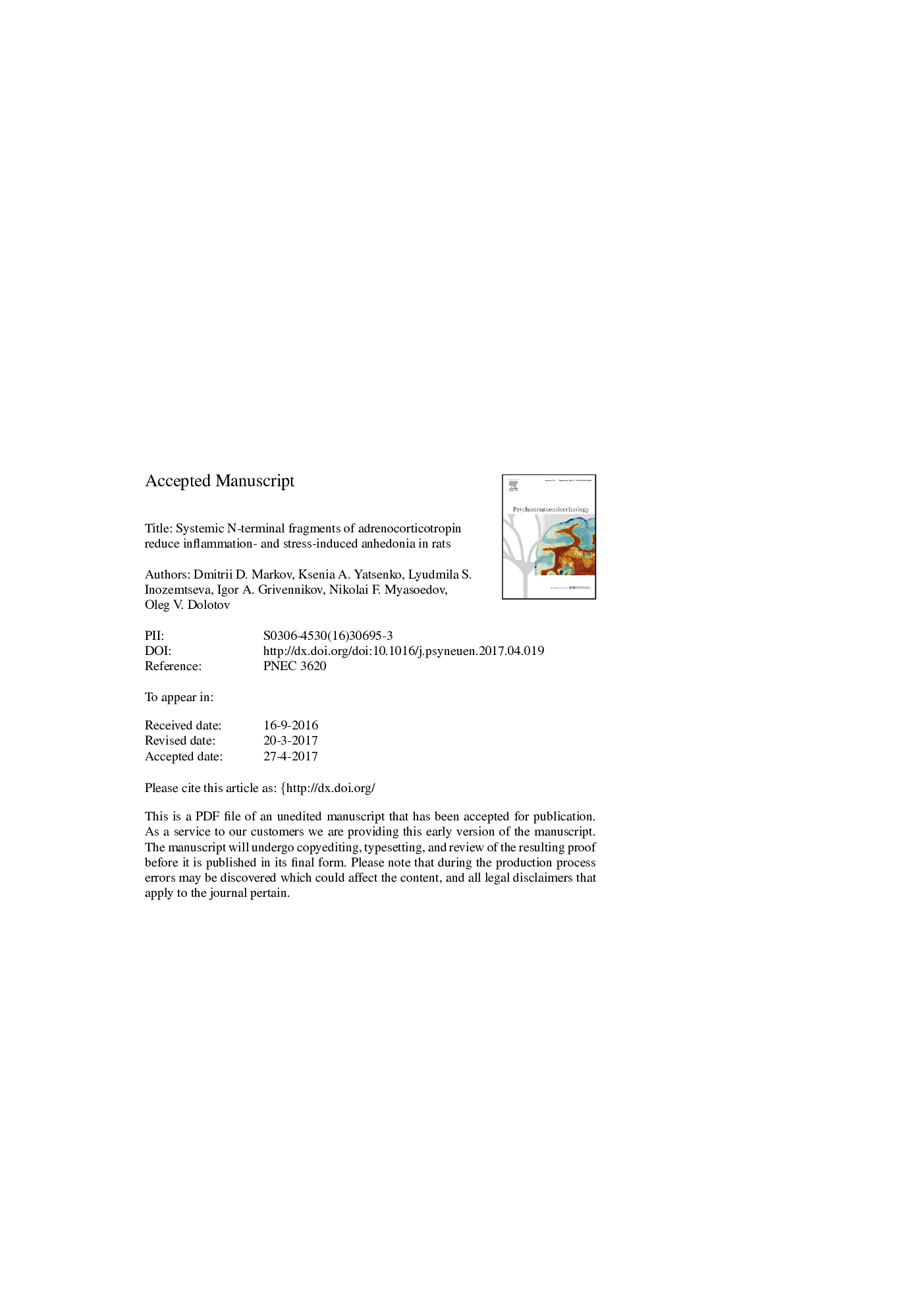| کد مقاله | کد نشریه | سال انتشار | مقاله انگلیسی | نسخه تمام متن |
|---|---|---|---|---|
| 4934383 | 1433961 | 2017 | 66 صفحه PDF | دانلود رایگان |
عنوان انگلیسی مقاله ISI
Systemic N-terminal fragments of adrenocorticotropin reduce inflammation- and stress-induced anhedonia in rats
دانلود مقاله + سفارش ترجمه
دانلود مقاله ISI انگلیسی
رایگان برای ایرانیان
کلمات کلیدی
موضوعات مرتبط
علوم زیستی و بیوفناوری
بیوشیمی، ژنتیک و زیست شناسی مولکولی
علوم غدد
پیش نمایش صفحه اول مقاله

چکیده انگلیسی
Emerging evidence implicates impaired self-regulation of the hypothalamic-pituitary-adrenal (HPA) axis and inflammation as important and closely related components of the pathophysiology of major depression. Antidepressants show anti-inflammatory effects and are suggested to enhance glucocorticoid feedback inhibition of the HPA axis. HPA axis activity is also negatively self-regulated by the adrenocorticotropic hormone (ACTH), a potent anti-inflammatory peptide activating five subtypes of melanocortin receptors (MCRs). There are indications that ACTH-mediated feedback can be activated by noncorticotropic N-terminal ACTH fragments such as a potent anti-inflammatory MC1/3/4/5R agonist α-melanocyte-stimulating hormone (α-MSH), corresponding to ACTH(1-13), and a MC3/5R agonist ACTH(4-10). We investigated whether intraperitoneal administration of rats with these peptides affects anhedonia, which is a core symptom of depression. Inflammation-related anhedonia was induced by a single intraperitoneal administration of a low dose (0.025 mg/kg) of lipopolysaccharide (LPS). Stress-related anhedonia was induced by the chronic unpredictable stress (CUS) procedure. The sucrose preference test was used to detect anhedonia. We found that ACTH(4-10) pretreatment decreased LPS-induced increase in serum corticosterone and tumor necrosis factor (TNF)-α, and a MC3/4R antagonist SHU9119 blocked this effect. Both α-MSH and ACTH(4-10) alleviated LPS-induced anhedonia. In the CUS model, these peptides reduced anhedonia and normalized body weight gain. The data indicate that systemic α-MSH and ACTH(4-10) produce an antidepressant-like effect on anhedonia induced by stress or inflammation, the stimuli that trigger the release of ACTH and α-MSH into the bloodstream. The results suggest a counterbalancing role of circulating melanocortins in depression and point to a new approach for antidepressant treatment.
ناشر
Database: Elsevier - ScienceDirect (ساینس دایرکت)
Journal: Psychoneuroendocrinology - Volume 82, August 2017, Pages 173-186
Journal: Psychoneuroendocrinology - Volume 82, August 2017, Pages 173-186
نویسندگان
Dmitrii D. Markov, Ksenia A. Yatsenko, Lyudmila S. Inozemtseva, Igor A. Grivennikov, Nikolai F. Myasoedov, Oleg V. Dolotov,